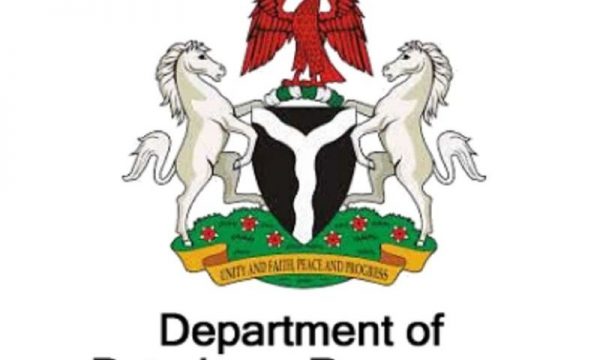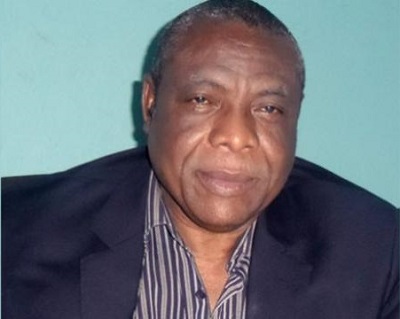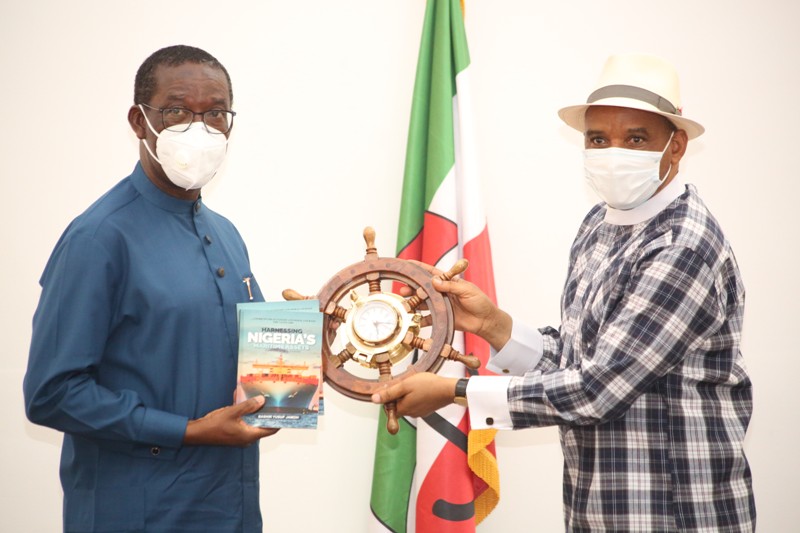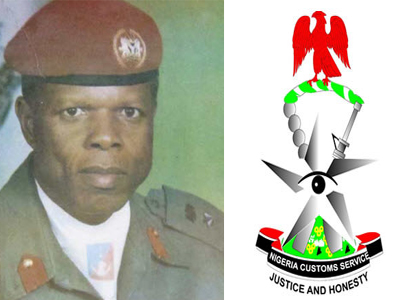DPR, NIMASA Fight Over Offshore Marine Job
 · IOCs go on loose on Nigerian seas
· IOCs go on loose on Nigerian seas
· Dead fishes: Shell debunks pollution, NIMASA keeps mum
By Kenneth Jukpor
Despite Nigeria’s efforts to exploit its blue economy potentials capable of generating over N7trillion annually, International Oil Companies (IOCs) in collaboration with the Department of Petroleum Resources (DPR) have been allowed to perpetuate illegalities on the nation’s waterways leading to huge monetary losses.
Experts posit that colossal fiscal losses have resulted from the illegal discharge of liquid waste on Nigerian waters, while DPR has also given approval for seabed operations, drilling and other offshore activities that should be regulated by the Nigerian Maritime Administration and Safety Agency (NIMASA).
Under the United Nations Convention on Laws of the Seas (UNCLOS), there is the International Seabed Association (ISA), an organization through which States party to UNCLOS organize and control all mineral-resources-related activities in the Area for the benefit of mankind.
ISA which became fully operational as an autonomous international organization in June 1996, has the mandate to ensure the effective protection of the marine environment from harmful effects that may arise from deep-seabed related activities and NIMASA is the designated authority for ISA.
In spite of these international conventions that place the onus of offshore seabed operations and marine environment on NIMASA, DPR continues to issue licenses and approvals for evacuation of marine waste, leading to a tussle between NIMASA and DPR.
DPR also carries out registration of Floating Production Storage and Offloading (FPSO) units, offshore personnel, among others while paying little attention to safety of the marine environment, whereas NIMASA has relegated to an observer, instead of a regulator.
Speaking with MMS Plus last week, a former Director General of NIMASA who preferred anonymity lamented that this lacuna was an indication that NIMASA has not started carrying out most of its responsibilities.
According to the ex-NIMASA boss, this problem persists because the agency doesn’t fully understand its mandate and lacks the requisite structure to function optimally.
“Look at the management of deep offshore fields, FPSOs and drilling offshore. The perception is that such activities are under the DPR and Nigerian National Petroleum Corporation (NNPC), however, these activities should be under NIMASA. If you’re to drill or lay a pipe on a seabed, you ought to get clearance from NIMASA but the agency doesn’t even have a department to do that,” the source told our correspondent.
He stressed that by virtue of the UNCLOS Convention, NIMASA is the designated authority for ISA and companies or individuals shouldn’t carry out functions on the seabed without clearance from NIMASA.
The ex-NIMASA Director General also argued that efficient management of this role would shore up the revenue of the agency, create jobs and ensure a better marine environment for shipping and related operations in the country.
The Managing Director, Sopetro Marine Limited, Mr. Mina Oforiokuma expressed worry at the rift between DPR and NIMASA, stating that the responsibility was clearly for NIMASA based on the international conventions ratified and domesticated in the nation.
Mina, who is also a Governing Council member of the Nigerian Content Development and Monitoring Board (NCDMB), added that the sector would be overburdened with charges and operational challenges if the issue isn’t addressed soon.
When quizzed by MMS Plus last week, a Director at NIMASA confirmed this challenge, lamenting that DPR has been unwilling to relinquish its grip on offshore operations where it affects licenses and the marine environment.
“It is NIMASA’s responsibility, however, NIMASA came onboard recently. DPR had developed its framework and guidelines for the sector and operations including offshore marine activities before NIMASA came up. The norm is that when a new agency comes up to undertake a responsibility, the former one should hands-off but that hasn’t happened with DPR,” the source said.
Although the NIMASA source claimed that the agency allowed DPR continue with the responsibility to maintain a sustainable environment, the Director lamented that the agency has been awash with unpalatable reports of marine pollution offshore.
“DPR’s role should be on the volume of products to be produced, standards and other issues; however, it is not the agency’s role to give permits or approvals where it affects marine environment management. If they must give such approvals, they should demand that operators first get NIMASA approval but they don’t do that. They are messing up the marine environment and it is a sad tale for the nation. Offshore waste and activities on the seabed are the responsibilities of NIMASA in line with UNCLOS and other marine environment regulations,” the source added.
The NIMASA Director, however, indicated that the agency had concluded plans to launch Offshore Waste Reception Managers to approve waste reception facilities for offshore waste.
Meanwhile, efforts to reach the Head, Public Affairs, DPR, Mr. Paul Osu were futile until presstime as the DPR spokesman didn’t pick his calls.
Recall that there were incidents of large quantities of dead fishes around the Bonny-Andoni shores and several other coastal communities along the Atlantic shoreline in the Niger Delta region.
The residents along the Atlantic coastline in Delta, Bayelsa, Rivers and Akwa Ibom reported massive death of croaker fish species, raising concerns of increased toxicity of the territorial waters.
Six weeks later, mysterious deaths were reported in Bonny Island in Rivers State, claiming about thirteen lives.
Meanwhile, NIMASA has refused to publicize its findings after carrying out an investigation on the mysterious incident.
Although MMS Plus learnt that the agency concluded its report on the incident about five weeks ago, efforts by our correspondent to obtain the report from the Corporate Communications department have been futile until presstime.
An environmentalist, Mr. Furoebi Akene, alleged that the dead fishes littering Niger Delta coastline were caused by the discharge of toxic chemicals from Shell’s operations at Ogulagha in Delta.
Contrarily, Shell Petroleum Development Company (SPDC) in a statement made available to the media said its activities had nothing to do with the dead fishes found in the Niger Delta coastline.
According to the statement signed by Mr. Bamidele Odugbesan, SPDC’s Media Relations Manager, there was no oil leakage from its activities linked to the dead fishes.
Odugbesan said that Shell was supporting the Delta Government in investigating the cause of the massive death of fishes as well as participating in ongoing joint investigation by oil industry regulators.
“The SPDC hereby clarifies that there is no release of dangerous, toxic or chemical substances from its operations at the Forcados oil terminal or from its facilities in Ogulagha or any part of the Niger Delta where the company operates,” the IOC said.








